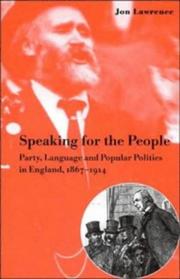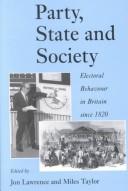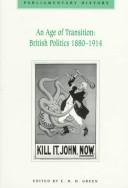| Listing 1 - 9 of 9 |
Sort by
|
Book
ISBN: 9780199550128 0199550123 0191701521 0191567760 1282235060 9786612235061 Year: 2009 Publisher: Oxford Oxford University Press
Abstract | Keywords | Export | Availability | Bookmark
 Loading...
Loading...Choose an application
- Reference Manager
- EndNote
- RefWorks (Direct export to RefWorks)
An engaging history of electioneering in Britain from the eighteenth century to the present, highlighting how the television age has altered the interaction of politicians and public and asking what the media must now do to reinvigorate public politics. - ;In this engagingly written history of electioneering in Britain from the eighteenth century to the present, Jon Lawrence explores the changing relationship between politicians and public. Throughout this period, he argues, British politics has been characterized by bruising public rituals intended to bestow legitimacy on politicians by oblig.
History of the United Kingdom and Ireland --- anno 1800-1999 --- Elections --- History. --- Histoire --- Great Britain --- Grande-Bretagne --- Politics and government --- Politique et gouvernement --- Political campaigns --- Campaigns, Election --- Campaigns, Political --- Election campaigns --- Electioneering --- Electoral politics --- Negative campaigns --- Politics, Practical --- History --- POLITICAL SCIENCE --- Elections. --- Political campaigns. --- Politics and government. --- Political Process --- General. --- 1700-1999. --- Great Britain.
Book
ISBN: 9780198779537 0198779534 Year: 2019 Publisher: Oxford ; New York, NY : Oxford University Press,
Abstract | Keywords | Export | Availability | Bookmark
 Loading...
Loading...Choose an application
- Reference Manager
- EndNote
- RefWorks (Direct export to RefWorks)
Many commentators tell us that, in today's world, everyday life has become selfish and atomised-that individuals live only to consume. But are they wrong? In Me, Me, Me, Jon Lawrence re-tells the story of England since the Second World War through the eyes of ordinary people-including his own parents- to argue that, in fact, friendship, family, and place all remain central to our daily lives, and whilst community has changed, it is far from dead. He shows how, in the years after the Second World War, people came increasingly to question custom and tradition as the pressure to conform to societal standards became intolerable. And as soon as they could, millions escaped the closed, face-to-face communities of Victorian Britain, where everyone knew your business. But this was not a rejection of community per se, but an attempt to find another, new way of living which was better suited to the modern world. Community has become personal and voluntary, based on genuine affection rather than proximity or need. We have never been better connected or able to sustain the relationships that matter to us. Me, Me, Me? makes that case that it's time we valued and nurtured these new groups, rather than lamenting the loss of more 'real' forms of community-it is all too easy to hold on to a nostalgic view of the past.
Communities --- Civilization. --- Communities. --- Manners and customs. --- History --- Since 1900 --- Great Britain --- England --- England. --- Social conditions --- Social life and customs --- Civilization --- Social conditions. --- Gruppenkohäsion. --- Sozialer Wandel. --- Since 1900. --- Great Britain.

ISBN: 0511585667 0511002092 9780511002090 9780511585661 052147034X 9780521470346 9780521893664 0521893666 Year: 1998 Publisher: Cambridge Cambridge University Press
Abstract | Keywords | Export | Availability | Bookmark
 Loading...
Loading...Choose an application
- Reference Manager
- EndNote
- RefWorks (Direct export to RefWorks)
Speaking for the People, first published in 1998, draws our attention to the problematic nature of politicians' claims to represent others, and in doing so it challenges conventional ideas about both the rise of class politics, and the triumph of party between 1867 and 1914. The book emphasises the strongly gendered nature of party politics before the First World War, and suggests that historians have greatly underestimated the continuing importance of the 'politics of place'. Most importantly, however, Speaking for the People argues that we must break away from teleological notions such as the 'modernisation' of politics, the taming of the 'popular', or the rise of class. Only then will we understand the shifting currents of popular politics. Speaking for the People represents a major challenge to the ways in which historians and political scientists have studied the interaction between party politics and popular political cultures.
Political culture --- Culture --- Political science --- History. --- Great Britain --- Politics and government --- 15.70 history of Europe. --- Arbeidersklasse. --- Culture populaire --- English language --- Geschichte (1867-1914). --- Geschichte 1867-1914. --- Langage politique. --- Partei. --- Partis politiques --- Political oratory --- Political oratory. --- Political parties --- Political parties. --- Politics and government. --- Politieke partijen. --- Politik. --- Popular culture --- Popular culture. --- Éloquence politique --- Öffentliche Meinung. --- Histoire --- Political aspects --- Political aspects. --- Langage --- History --- 1837-1936. --- Grande-Bretagne --- Great Britain. --- Gro�britannien. --- Politique et gouvernement --- Parliamentary oratory --- Political speaking --- Oratory --- Politics, Practical --- Public speaking --- Rhetoric --- Germanic languages --- History of the United Kingdom and Ireland --- anno 1800-1999 --- Arts and Humanities
Article
Abstract | Keywords | Export | Availability | Bookmark
 Loading...
Loading...Choose an application
- Reference Manager
- EndNote
- RefWorks (Direct export to RefWorks)

ISBN: 1859280463 Year: 1997 Publisher: Brookfield, Vt. Scolar Press
Abstract | Keywords | Export | Availability | Bookmark
 Loading...
Loading...Choose an application
- Reference Manager
- EndNote
- RefWorks (Direct export to RefWorks)
History of the United Kingdom and Ireland --- anno 1800-1999 --- Elections --- Voting --- Polls --- Politics, Practical --- Social choice --- Suffrage --- History --- Great Britain --- Politics and government --- 20th century --- 19th century --- Elections - Great Britain - History. --- Voting - Great Britain - History. --- Balloting
Book
ISBN: 9780521518826 9780511973901 9781107679641 9780511860935 0511860935 9780511858321 0511858329 0511859198 9780511859199 0521518822 051197390X 0511861699 1107216133 1283006065 9786613006066 0511860064 0511857454 1107679648 Year: 2011 Publisher: Cambridge Cambridge University Press
Abstract | Keywords | Export | Availability | Bookmark
 Loading...
Loading...Choose an application
- Reference Manager
- EndNote
- RefWorks (Direct export to RefWorks)
This major collection of essays challenges many of our preconceptions about British political and social history from the late eighteenth century to the present. Inspired by the work of Gareth Stedman Jones, twelve leading scholars explore both the long-term structures - social, political and intellectual - of modern British history, and the forces that have transformed those structures at key moments. The result is a series of insightful, original essays presenting new research within a broad historical context. Subjects covered include the consequences of rapid demographic change in the eighteenth and nineteenth centuries; the forces shaping transnational networks, especially those between Britain and its empire; and the recurrent problem of how we connect cultural politics to social change. An introductory essay situates Stedman Jones's work within the broader historiographical trends of the past thirty years, drawing important conclusions about new directions for scholarship in the twenty-first century.
History of civilization --- History of the United Kingdom and Ireland --- anno 1800-1999 --- Great Britain --- Politics and government --- Social conditions --- Intellectual life --- HISTORY. --- Intellectual life. --- Politics and government. --- Social conditions. --- 1800-2099. --- Great Britain. --- Arts and Humanities --- History --- National characteristics, British --- History.

ISBN: 0853236763 0853236860 9781846312816 1846312817 9781781386323 1781386323 9780853236764 9780853236863 Year: 2001 Publisher: Liverpool Liverpool University Press
Abstract | Keywords | Export | Availability | Bookmark
 Loading...
Loading...Choose an application
- Reference Manager
- EndNote
- RefWorks (Direct export to RefWorks)
This collection of twelve essays represents an important contribution to the understanding of child welfare and social action in the nineteenth and twentieth centuries. They challenge many assumptions about the history of childhood and child welfare policy and cover a variety of themes including the physical and sexual abuse of children, forced child migration and role of the welfare state.
Social policy and particular groups --- anno 1800-1999 --- Child welfare --- Female juvenile delinquents --- Immigrant children --- Social action --- Social policy --- Social problems --- Child immigrants --- Children --- Immigrants --- Delinquent girls --- Juvenile delinquents --- Child protective services --- Child protective services personnel --- CPS (Child protective services) --- Humane societies --- Protection of children --- Family policy --- Public welfare --- Social work with children --- Social work with youth --- History --- Charities --- Charities, protection, etc. --- Protection --- Law --- General and Others
Book
Abstract | Keywords | Export | Availability | Bookmark
 Loading...
Loading...Choose an application
- Reference Manager
- EndNote
- RefWorks (Direct export to RefWorks)


ISBN: 9780585070254 9780748609260 Year: 2022 Publisher: Edinburgh Edinburgh University Press
Abstract | Keywords | Export | Availability | Bookmark
 Loading...
Loading...Choose an application
- Reference Manager
- EndNote
- RefWorks (Direct export to RefWorks)
| Listing 1 - 9 of 9 |
Sort by
|

 Search
Search Feedback
Feedback About UniCat
About UniCat  Help
Help News
News